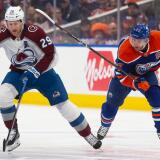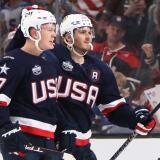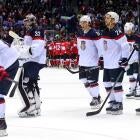Why did this Mike Ribeiro goal count? A quick rules lesson
Isn't the play supposed to automatically stop when a goalie loses his helmet? Not always. A quick rules lesson.
The only bright spot for the Washington Capitals on Thursday night was Mike Ribeiro's first-period goal that gave his team an early 1-0 lead.
But it wasn't without a little bit of confusion.
Just before Ribeiro scored, Penguins goalie Marc-Andre Fleury was bumped by his teammate, Brooks Orpik, and lost his mask after falling to the ice. There was instantly a discussion as to why the play was allowed to continue -- and Ribeiro's goal allowed to stand -- when the goalie was forced to play without a helmet.
Isn't the play supposed to automatically stop when a goalie loses his helmet? Did the refs blow it?
No. No, they did not.
According to the NHL rule book, rule 9.5:
When a goalkeeper has lost his helmet and/or face mask and his team has possession of the puck, the play shall be stopped immediately to allow the goalkeeper the opportunity to regain his helmet and/or face mask. When the opposing team has possession of the puck, play shall only be stopped if there is no immediate and impending scoring opportunity. This stoppage of play must be made by the Referee. When play is stopped because the goalkeeper has lost his helmet and/or face mask, the ensuing face-off shall take place at one of the defending team’s end zone face-off spots.
That actually seems like it's backwards when looking at it simply from a player-safety perspective, doesn't it?
If the goalie's team is in possession of the puck, meaning the goalie is no immediate danger, the play is automatically stopped. But if a guy on the other team has the puck on his stick and is in a position to fire a shot in the general direction of the helmetless goalie, play is allowed to continue.
Interesting. And based on the immediate reaction following the goal, it doesn't seem to be a rule that's widely known.
Either way, that's why play continued and Ribeiro was able to score even though the goalie was without his helmet.
For more hockey news, rumors and analysis, follow @EyeOnHockey and @Agretz on Twitter and like us on Facebook. Also, subscribe to our YouTube Channel.

















